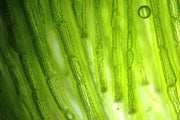THE DEEP SEA POWER PLANT - KELP

What Is Kelp?
Sometimes the terminology can get confusing, but here are the basics: sea kelp is a type of seaweed, and seaweed is a type of sea algae. Kelp is a brown subdivision of seaweed. It is quite similar, although not identical, to Nori, the seaweed that we use in wrapping up sushi rolls (as a side note, feel free to feed Nori to your dog!).
Kelp is nicknamed the 'superfood from the sea' because it contains 10 times more calcium than milk and more Vitamin C than orange juice.
The Health Benefits of Kelp for Dogs
By incorporating Kelp into our Basil’s Superfood range, we are giving you the opportunity to boost your dog’s overall health.
From enhancing their immune response to ensuring healthy cell functioning, kelp serves as an excellent dietary addition. Its rich range of nutrients not only aids in maintaining energy levels but also helps improve heart health and longevity.
· Kelp can improve skin and coat health due to the omega fatty acids contained within it. The antioxidants found in kelp can also combat stress on your dog’s skin cells, reducing dryness, itchiness and other common issues, promoting vibrant fur and healthy skin.
A glossy coat is more than just beautiful; it’s a sign of excellent overall canine health – a reflection of your dog’s inner vitality.
· This amazing superfood is packed with antioxidants and rich in vitamins which are vital components in boosting the immune system to fight off harmful bacteria and viruses. From skin allergies to more severe conditions, kelp has the ability to equip your dog’s body with the nutrients needed to ward off infection, boost their defence mechanism, all while promoting overall vitality.
· Not only a delicious addition to your dog’s diet, kelp can also provide support for their thyroid and endocrine system. The naturally occurring iodine found in kelp can help to regulate the thyroid gland, which plays a crucial role in maintaining metabolism and overall hormone balance. A healthy functioning thyroid ensures that your dog’s energy levels are optimal, their weight is well maintained and their body is functioning at its best. So, the addition of kelp can contribute to better overall health.
· Kelp has the potential to offer incredible dental health benefits for dogs, including plaque prevention, healthy teeth and gums. A compound unique to kelp is phlorotannin. Phlorotannins are a type of Polyphenol that have shown strong antibacterial and antifungal effects against different microorganisms, including those that can cause dental health issues in dogs, like plaque and tartar build up. In addition, the minerals found in kelp, such as calcium and magnesium may also help to strengthen teeth and promote healthy gums.
· Rich in fibre, kelp has the potential to enhance your dog’s digestion and gut health. Combined with the other ingredients in Basil’s new Superfood range, kelp can ensure a healthy microbiome for your four-legged friend.
So, although this power plant may not look very appealing, it really does pack a punch!
Why not give your four-legged friend a boost of the best with our new Basil’s Superfood Range today!










